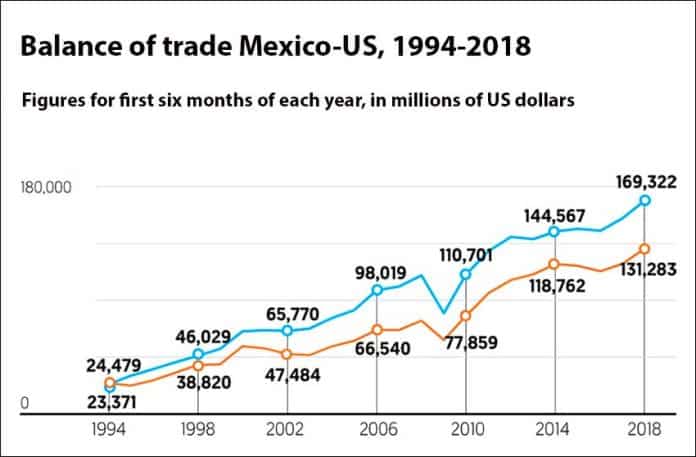Trade between Mexico and the United States reached record highs in both directions in the first six months of 2018, according to the U.S. Department of Commerce.
Mexico’s exports to the United States increased by 9.1% in the January to June period while it spent 10.2% more on American products in the same period than it did in the first half of last year.
In total, Mexican products worth just over US $169.3 billion crossed the border in the six-month period while almost US $131.3 billion worth of American products entered Mexico.
United States imports from China and Canada were also up — by 8.6% and 6.5% respectively — compared to the same period last year, the department said.
The news comes as uncertainty surrounding the future of the North American Free Trade Agreement (NAFTA) still remains.
Nevertheless, Mexico’s participation in the import market of its northern neighbor has remained unchanged in the first half of each year from 2016 to 2018 at 13.7%.
Mexico’s main exports to the United States between January and June were vehicles, auto parts, machinery, electrical and electronic equipment, agricultural products, fossil fuels, optical instruments and medical devices.
The data shows that the economic ties between the two countries have become stronger despite a straining in the broader relationship, largely due to the hardline attitude United States President Donald Trump has adopted towards Mexico on issues such as migration, border security — including his proposed wall — and trade.
The surplus of just over US $38 billion Mexico recorded with the United States in the first half of this year will likely serve to further irk Trump, who has railed against deficits, arguing that they are indicative of unfair trade although many economists argue that they are not the best way to gauge the health of a trade relationship.
The United States also recorded deficits of US $185.7 billion with China and US $8 billion with Canada in the same period.
Earlier today, Trump tweeted “fixing our terrible trade deals is a priority — and going very well” while yesterday he wrote “tariffs are working big time” without specifically stating which ones he was referring to.
The United States introduced steel and aluminum tariffs on both Mexico and Canada from June 1, further complicating the already strained NAFTA renegotiation process and triggering the imposition of retaliatory measures by both U.S. neighbors.
While Trump has floated the idea that the United States could seek separate trade deals with its two neighbors, Mexico and Canada have remained committed to maintaining the 24-year-old agreement as a thee-way pact.
Last week, Mexico publicly accepted for the first time the United States proposal to include set minimum wages for the automotive industry as part of a modernized NAFTA.
Mexican and Canadian officials also said that Mexico and the U.S. were getting closer to reaching a deal on rules of origin for the auto sector.
Source: El Economista (sp)
